
Graham Chapman was a British actor, comedian and writer. He was one of the six members of the surrealist comedy group Monty Python. He portrayed authority figures such as The Colonel and the lead role in two Python films, Holy Grail (1975) and Life of Brian (1979).

Monty Python's Life of Brian is a 1979 British black comedy film starring and written by the comedy group Monty Python. It was directed by Jones. The film tells the story of Brian Cohen, a young Judaean man who is born on the same day as—and next door to—Jesus, and is subsequently mistaken for the Messiah.
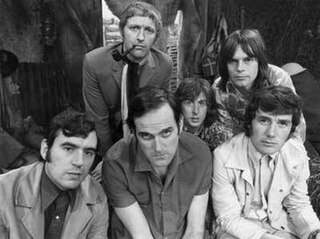
Monty Python were a British comedy troupe formed in 1969 consisting of Graham Chapman, John Cleese, Terry Gilliam, Eric Idle, Terry Jones, and Michael Palin. The group came to prominence for the sketch comedy series Monty Python's Flying Circus, which aired on the BBC from 1969 to 1974. Their work then developed into a larger collection that included live shows, films, albums, books, and musicals; their influence on comedy has been compared to the Beatles' influence on music. Their sketch show has been called "an important moment in the evolution of television comedy".

Monty Python and the Holy Grail is a 1975 British comedy film satirizing the Arthurian legend, written and performed by the Monty Python comedy group and directed by Gilliam and Jones in their feature directorial debuts. It was conceived during the hiatus between the third and fourth series of their BBC Television series Monty Python's Flying Circus.

Eric Idle is an English actor, comedian, songwriter, musician, screenwriter and playwright. He was a member of the British comedy group Monty Python and the parody rock band the Rutles. Idle studied at Pembroke College, Cambridge, and joined Cambridge University Footlights.
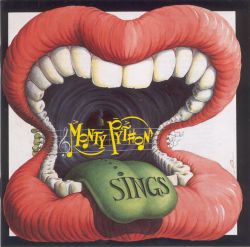
Monty Python Sings is a compilation album of songs by English comedy troupe Monty Python. Released in 1989 to celebrate their 20th anniversary, it contains popular songs from their previous albums and films. The album was dedicated to the memory of founding member Graham Chapman, who died two months before its release.
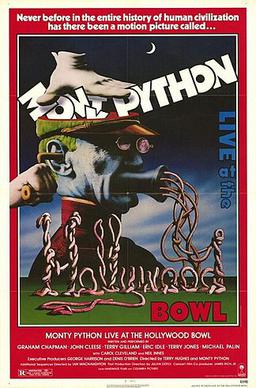
Monty Python Live at the Hollywood Bowl is a 1982 concert comedy film directed by Terry Hughes and starring the Monty Python comedy troupe as they perform many of their sketches at the Hollywood Bowl. The film also features Carol Cleveland in numerous supporting roles and Neil Innes performing songs. Also present for the shows and participating as an 'extra' was Python superfan Kim "Howard" Johnson.
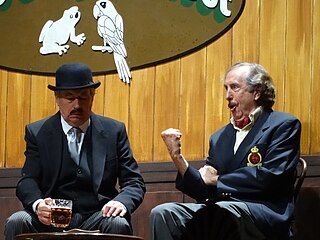
"Candid Photography", better known as "Nudge Nudge", is a sketch from the third Monty Python's Flying Circus episode, "How to Recognise Different Types of Trees From Quite a Long Way Away" featuring Eric Idle and Terry Jones as two strangers who meet in a pub.

The Odd Job is a 1978 British comedy film starring Monty Python member Graham Chapman. It tells the story of a man named Arthur Harris (Chapman) who is recently abandoned by his wife. He becomes so depressed that he hires an "odd job man" to kill him. Once his wife returns, Harris finds himself unable to cancel the contract.
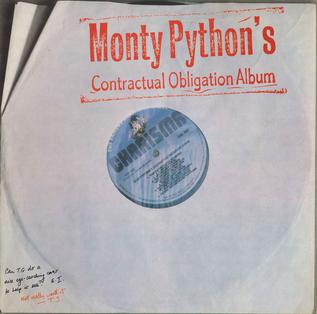
Monty Python's Contractual Obligation Album is the final studio album by Monty Python, released in 1980. As the title suggests, the album was put together to complete a contract with Charisma Records. Besides newly written songs and sketches, the sessions saw re-recordings of material that dated back to the 1960s pre-Python shows I'm Sorry, I'll Read That Again, The Frost Report, At Last The 1948 Show and How To Irritate People. One track, "Bells", dates from the sessions for Monty Python's Previous Record, while further material was adapted from Eric Idle's post-Python series Rutland Weekend Television. The group also reworked material written but discarded from early drafts of Life Of Brian, as well as the initial scripts for what would eventually become The Meaning Of Life.

Monty Python's Personal Best is a miniseries of six one-hour specials, each showcasing the contributions of a particular Monty Python member. Produced by Python (Monty) Pictures Ltd., the series first aired on PBS stations between 22 February and 8 March 2006, although the Eric Idle and Michael Palin episodes were initially released by A&E on two Region 1 DVDs in 2005; the remaining episodes were released in late February 2006.
"Sit on My Face" is a short song written by Eric Idle and performed by the members of the comedy troupe Monty Python, which originally appeared on the album Monty Python's Contractual Obligation Album and later appeared on the compilation Monty Python Sings. The song's lyrics are sung to the melody of "Sing As We Go" (1934) by Harry Parr-Davies, made popular by Gracie Fields. The opening gives way to the voices of The Fred Tomlinson Singers singing "Sit on my face and tell me that you love me." The remaining lyrics contain numerous references to fellatio and cunnilingus, such as "when I'm between your thighs you blow me away" and "life can be fine if we both 69".

Python Night was an evening of Monty Python-related programmes broadcast on BBC2 on 9 October 1999, to celebrate the 30th anniversary of the first broadcast of Monty Python's Flying Circus. It featured newly written sketches, three documentaries and a screening of Monty Python's Life of Brian.

Monty Python Live at Aspen was a reunion show featuring the surviving members of the Monty Python team: John Cleese, Terry Gilliam, Eric Idle, Terry Jones and Michael Palin, appearing on stage together for the first time since their Hollywood Bowl shows in 1980. Filmed on 7 March 1998 at the Wheeler Opera House in Colorado as part of The US Comedy Arts Festival, it featured the five Pythons in an interview with host Robert Klein. The late Graham Chapman was also allegedly in attendance as his "ashes" were brought out in an urn with his portrait attached to the front, only to be knocked over by Terry Gilliam.

A Liar's Autobiography: The Untrue Story of Monty Python's Graham Chapman is a 2012 British animated semi-biographical comedy film that is a portrayal of the life of Monty Python alumnus Graham Chapman. The film is loosely based on A Liar's Autobiography: Volume VI, a book written by Chapman and David Sherlock. It received a limited theatrical release on 2 November 2012 in the United States, and aired on the Epix TV channel on the same day.
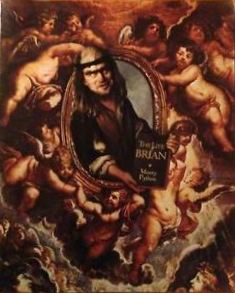
Monty Python's The Life of Brian/MONTYPYTHONSCRAPBOOK is a large format book by Monty Python, released in 1979 to tie in with their film Monty Python's Life of Brian. As the title suggests, it consists of two separate books joined together. The first contains the film's screenplay, illustrated by black and white stills. On the reverse side is the scrapbook, which contains a variety of material such as scenes cut from the film, newly written material plus unrelated items, including the lyrics to Bruces' Philosophers Song. The book was assembled by Eric Idle, with assistance from Michael Palin.

Life of Python is the name of two documentaries, both intended to mark 20 years of the Monty Python team in 1989, but broadcast the following year after the death of team member Graham Chapman on 4 October - the eve of the 20th anniversary.

The Fairly Incomplete & Rather Badly Illustrated Monty Python Song Book is a compendium of songs by Monty Python, released in 1994 on the occasion of their 25th anniversary. The book contains the lyrics and musical scores for songs from the group's Flying Circus TV series, albums and films. Also included are "The Ferret Song" and "Rhubarb Tart Song", which originate from I'm Sorry, I'll Read That Again before appearing on At Last The 1948 Show. The musical scores were edited by regular Python collaborator, John Du Prez.

The Pythons Autobiography by The Pythons is the official autobiography of the Monty Python team, released in 2003. It covers the whole of Python history, from their childhoods all the way through to the 30th anniversary celebrations in 1999.


















